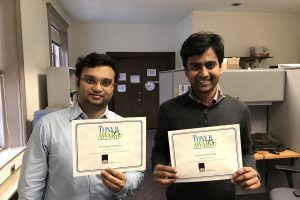
Soumik Siddhanta, Postdoctoral Fellow, and Santosh Paidi, PhD candidate, from the Department of Mechanical Engineering were recently selected to receive the highly competitive SLAS 2019 Tony B. Academic Travel Award by the Society for Laboratory Automation and Screening.
The prestigious award recognizes up-and-coming researchers who have demonstrated outstanding achievement in laboratory science and technology. The winners, which included 50 researchers from 12 different countries, earned invitations to present their work at the 2019 SLAS International Conference and Exhibition in Washington, D.C., February 2-6.
Siddhanta presented his research paper entitled “Label-free SERS platform for rapid screening of protein-tethered drug molecules.”
Siddhanta is a Postdoctoral Fellow working in the laboratory of Prof. Ishan Barman. Siddhanta’s research interests include molecular imaging, vibrational spectroscopy, plasmonics, and biophotonics. His work focuses on harnessing the potent combination of the engineered plasmonic nanoprobes and label-free plasmon enhanced vibrational spectroscopy for diagnosis, imaging, manipulation and control of biological structure and function from the nanoscale to the tissue level. During his PhD, Siddhanta worked on developing label-free methods to probe small molecule-protein interactions through surface-enhanced Raman spectroscopy. He was the recipient of Indo-US Science and Technology Forum (IUSSTF) Student Research Fellowship in 2014, and the American Society for Laser Medicine & Surgery (ASLMS) Research Grant, 2016-17.
Paidi presented his research paper entitled “Mechanical Trap Surface-Enhanced Raman Spectroscopy for Live Three-Dimensional Molecular Imaging of Single Cells.”
Paidi is completing his PhD under the supervision of Prof. Barman. His current research efforts are directed towards the application of Raman spectroscopy and multivariate data analysis to develop novel quantitative approaches for addressing unmet needs in the molecular study of cancers. In addition to applications in cancer, a major focus of Paidi’s graduate work is the development of a detection framework based on label-free plasmon-enhanced Raman spectroscopy for rapid identification of closely related human and murine antibody drugs during their manufacturing. In addition to the SLAS travel award, he has received the SLAS Graduate Education Fellowship Grant, Coblentz Student Award, Tomas A. Hirschfeld Scholar Award, Whiting School Doctoral Fellowship, Molecular Medicine Tri-Conference Student Fellowship, and Undergraduate Research Award by IIT Bombay in recognition of his work.
SLAS is an international community of nearly 20,000 professionals and students dedicated to life sciences discovery and technology. SLAS 2019 focused on emerging laboratory technologies from a broad range of industries, including drug discovery and development, informatics, clinical diagnostics, food and agricultural sciences, forensics and security sciences, and consumer products.